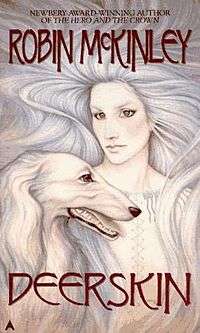Deerskin (novel)
|
First edition cover | |
| Author | Robin McKinley |
|---|---|
| Country | United States |
| Language | English |
| Genre | Fairytale fantasy |
| Publisher | Ace Books |
Publication date | 1 June 1993 |
| Media type | |
| Pages | 309 pp |
| ISBN | 0-441-14226-5 |
Deerskin is a dark fantasy novel by Robin McKinley, first published in 1993.[1] It is based on an old French fairy tale by Charles Perrault called Peau d'âne (English translation: Donkeyskin).[2] It was nominated for the Mythopoeic Fantasy Award for Adult Literature.[3]
The book contains numerous adult themes including incest, rape, and miscarriage. It features McKinley's typical protagonist, the resourceful heroine overcoming psychological trauma, and her favored motif of the animal helper.[4]
Plot summary
Although Lissar is the daughter of the most beautiful queen and most handsome king in all the land, she is a lonely child whose only true companion is her dog, Ash. She was mostly ignored during her childhood due to the fact that her parents were the two most splendid people in all the seven kingdoms.
Lissar's mother falls ill and starts to lose her beauty. This causes her to lose her will to live, because she wants to be remembered as the most beautiful person, and nothing less. She sends for artists from all the kingdoms, and eventually one is chosen to paint a portrait of her as she was before her illness. He works nonstop, as if driven, for a fortnight until the painting is completed and shown to the queen.
After looking at the painting, she forces the king to swear that he will only remarry if he can find a bride more beautiful than she, and after he acquiesces, she dies. This seemingly impossible condition is not, however, insurmountable: as Lissar matures, she becomes not only the very image of her mother, but even more beautiful than her parents. The king becomes obsessed with his daughter, and insists that he wants to marry her. Lissar refuses him and locks herself in a room. Eventually the king finds a way into the room, rapes Lissar and almost kills Ash.
Lissar and Ash escape from the king and find their way to a cabin in the mountains. Lissar, impregnated by her father the king, miscarries and nearly dies. Lissar is saved by a moon goddess, who gives her a white deerskin dress (referenced in the title) and alters both Lissar and Ash so that they are unrecognizable; Lissar's hair changes from black to white, and Ash grows a coat similar to that of a borzoi. As another gift the goddess gives Lissar time to heal and to forget what happened to her. Lissar travels to a different kingdom and offers to work for the king. The prince, Ossin, assigns her to raise a litter of puppies whose mother had died.
The goddess's alterations, however, were more than physical. Lissar, now identified as Deerskin, discovers that she has supernatural powers, including the ability to find lost children and objects. She falls in love with Ossin and he with her, but, still burdened by her past, she flees when Ossin proposes to her at a ball and returns to the cabin in the mountains with Ash and the puppies.
After spending the winter recovering, Deerskin feels compelled to return to Ossin's city, following an urgent call. As she nears the city, she hears about a wedding and assumes that it is Ossin's. She realizes to her horror that the king, her father, is going to marry Ossin's younger sister. Deerskin reveals her true identity as the bridegroom's daughter and calls her father to account for his actions, using the goddess's powers to punish him for his crimes. Confronting her father finally frees Lissar to accept Ossin's love. The story ends with Lissar tentatively coming back to Ossin, offering to give their relationship a chance.
References
- ↑ McKinley, Robin. Deerskin. Fantastic Fiction.
- ↑ "Introduction to article". Project Muse.
- ↑ "Mythopoeic Award Nominations". LibraryThing.
- ↑ Haase, Donald (2008). "G-P". The Greenwood Encyclopedia of Folktales and Fairy Tales. Greenwood. pp. 612–3.
Further reading
- Rutledge, Amelia A. "Robin McKinley's Deerskin: Challenging Narcissisms." Marvels and Tales: Journal of Fairy Tales Studies 15.2 (2001): 168-182. Rpt. in Children's Literature Review. Ed. Tom Burns. Vol. 127. Detroit: Gale, 2008. Literature Resource Center. Web. 26 May 2011.
